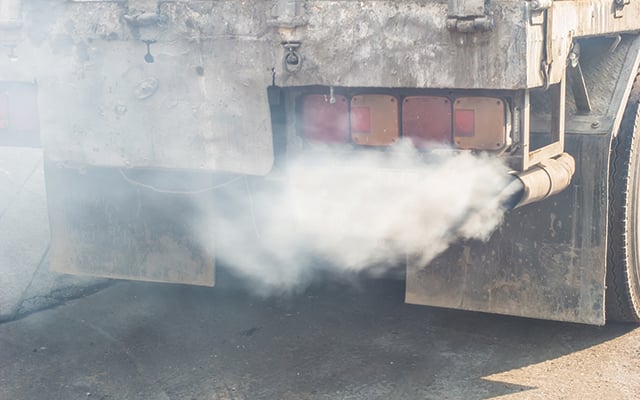Worker faced off against boss over exhaust fumes in office; worker claimed unjust dismissal, company claimed resignation

A New Brunswick worker who experienced health issues due to exhaust fumes coming into her trucking company’s office was surprised to find she had been replaced when she came back from sick leave. The company said she had resigned because of her health issues, but an adjudicator disagreed and pegged the company as terminating the worker’s employment.
Alternate Waste Management (AWM) is a trucking company based in Minto, N.B. The company’s business includes transporting garbage, peat moss, rubber, and other general goods to destinations within and outside of New Brunswick, and it operates mainly out of a large building that includes four service bays for AWM vehicles and an administrative office.
Susan Barton, 45, was hired by AWM in July 2016 to be the office manager, reporting to the president and working alongside the operations manager, performing various administrative duties. The office was in the facility adjacent to the vehicle service bays, so frequently the noise from the bays from vehicles and tools made it loud in the office.
Soon after she began working with AWM, Barton discovered the noise from the service bays became unpleasant over the course of the workday. In addition, exhaust fumes from the vehicles seeped into the office through the doors, causing her discomfort.
Barton tried to shut the office door when the fumes were bad, but she believed truck exhaust pipes were never connected to the shop exhaust system that was supposed to vent the fumes outside. The fumes frequently got to her and she often had to miss work.
Barton discussed the air quality and noise level with AWM’s president on several occasions, noting that she had a history of sensitivity to loud noises. In July 2017, she wrote an email to him outlining her responsibilities and the problems she was experiencing because of the work environment. She suggested working from home most of the time.
The president refused Barton’s request to work from home, as part of her job duties was to act as a receptionist in the office. He said he was prepared to build an office on the building’s second floor that was farther away from the noise and fumes from the service bays, but argued vehicles were rarely running while in the service bays, so there wasn’t a need to connect them to the shop exhaust system. In addition, the president pointed out that the building was a trucking company shop and she had been aware of the nature of the business when she took the job.
However, Barton continued to experience health problems until December 2017, when she brought a medical note to work indicating she required one week of sick leave until Dec. 28. However, when she returned, the president seemed surprised to see her. He had thought her sick leave would be longer and he had hired another individual to do her duties in her absence, saying “working here obviously makes you sick” and there was nothing more he could do for her.
The president offered Barton a “layoff,” so Barton finished her work on the payroll for that week and prepared her own record of employment. The president asked her to help train the new worker, so she contacted the new worker, who explained that he had been offered a full-time job at AWM but he wasn’t going to accept.
Barton also filed a complaint with WorksafeNB about fumes in the service bay not being vented outside and the office door not being properly sealed. WorksafeNB investigated and found that the exhaust system was under repair and wasn’t compliant with provincial health and safety regulations. AWM repaired the system and was deemed compliant on Jan. 26, 2018.
Barton then filed a complaint that she had been unjustly dismissed from her employment, as AWM hadn’t adequately protected her from an unhealthy work environment and it dismissed her because of her raising of health and safety issues and her illness, which she claimed was carbon monoxide poisoning. AWM denied terminating her employment, arguing she resigned because couldn’t work because of her health issues, it had tried to make the workplace better for her — as evidenced by the WorksafeNB assessment — and it would welcome her back if she wanted to return.
The adjudicator noted that Barton claimed her doctor believed she had carbon monoxide poisoning, but she didn’t provide medical evidence — no test results or written doctor’s opinion. As a result, he couldn’t infer the condition based only on Barton’s “self-serving and uncorroborated statement.”
However, the adjudicator found that working in AWM’s office did expose Barton to some level of exhaust fumes — the president acknowledged the situation and agreed to relocate the office to the second floor. But did she resign her position because of the workplace conditions or was she dismissed because of her complaints and illness?
The adjudicator found that Barton was dismissed from her employment. There was a personal dispute between Barton and the president over the work environment. The president was “clearly frustrated” with Barton's complaints and only agreed to move the office reluctantly. When Barton went on sick leave, the president offered her job to another individual. Though he managed to get Barton’s help in training her intended replacement, his motivation was to end Barton’s employment, said the adjudicator in determining Barton was unjustly dismissed.
Barton didn’t seek reinstatement in her complaint, so the adjudicator ordered AWM to pay her the equivalent of six weeks’ wages plus five days’ wages as severance pay for her 17 months of service. See Barton and Alternate Waste Management Corp., Re, 2019 CarswellNat 1536 (Can. Lab. Code Adj.).




